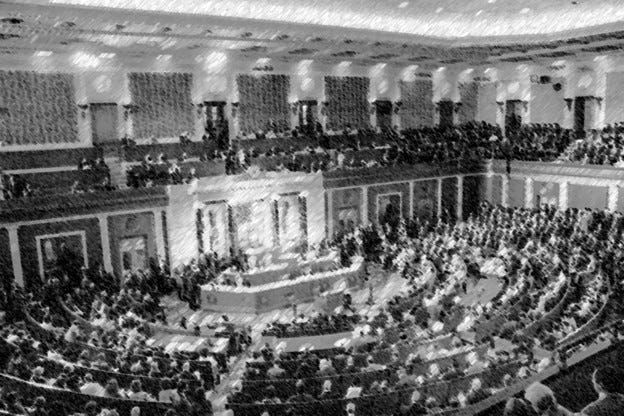Surprising most in Washington, Kevin McCarthy (R-CA) was elected Speaker of the House for the 118th Congress on the 15th ballot late Saturday night. Many people have lamented the concessions he made to conservatives to cobble together enough votes to secure the office, with particular attention on the House rules, fearing that McCarthy gave away too much power to the far-right wing to disrupt the House and threaten the budget process. It is possible things will play out that way, but House rules are complicated, and resist over-simplification.
The rules package is being described in the media as a series of concessions to right-wing hard-liners weakening the power of the Speaker and strengthening the right’s ability to block legislation, but the powers ceded to the right were actually devolved to any faction that is organized to use them. Lowering the motion to vacate threshold to five Republicans or even a single member of the caucus weakens the Speaker to challenges from the far-right factions, but also from more moderate factions if they choose to use this power.
Congressional rules were top-of-mind for Alice Rivlin just before her death in 2019. She repeatedly said as she passed her uncompleted manuscript to us, “We have to change the rules, and change the tone of American politics” if we are to see greater bipartisan cooperation and end the gridlock in Washington. This was her guidance to help us finish the uncompleted final chapter of “Divided We Fall; Why Consensus Matters.” The book contains a complex analysis of how the rules enable or inhibit bipartisan progress arriving at the conclusion that the rules in any congress can be used by a unified majority to block bipartisan legislation, but when congressional leaders reach bipartisan agreement to pass compromise legislation, the rules do not stand in the way.
We will not know how good or terrible the rules for the 118th Congress are until they are put to the test in legislative battles for routine issues and in the face of the crises that will arrive, some manufactured by the Republican House majority, and others as true surprise outside shocks and threats. In routine practice, and in emergencies, the rules, are likely to have less influence on history, than the decisions of the majority and minority leaders in both the House and the Senate. This in turn will be influenced by the decisions of individual members to remain loyal to the nation, or to their political parties, or to fracture into factions. Leaders are empowered by the decisions of followers to remain unified as were the House Democrats in 2022 under Speaker Nancy Pelosi or splinter as the House Democrats did in 1981 when Thomas P. “Tip” O’Neill was Speaker and Ronald Reagan was the newly elected President, and a faction of Democratic members, nicknamed the “Boll Weevils” gave the Republicans a working House majority on budget issues.
There is general agreement that McCarthy negotiated a package of rules that weakened his powers in order to secure the Speaker’s gavel, but Alice would have generally been in favor of the direction of the change. She believed strong leaders have tended to prefer rules that allow them more power to block bipartisan legislation than empower it (the exception being Pelosi who accepted “Break the Gridlock” rules proposed by the bipartisan Problem Solvers Caucus that allowed members to force a floor vote on any measure that was supported by a bipartisan majority). Relying on the insights of Pelosi’s former Chief of Staff, John Lawrence on the tradeoff between efficiency and broad participation, we write in Chapter 11, “Democratization of the processes of democracy is desirable, but it has a cost that must sometimes be paid with patience—on matters that are too important for endless patience.”
In the days before the Speaker vote circus, Washington Post Columnist Steven Perlstein implored Republican moderates assert themselves in an “Uprising of the Serious” to insist that Congress adopt “open rules” to insure that when legislation comes to the House floor, members can offer amendments, but this is just what the Speaker’s vote holdouts insisted upon and received in the rules package the House is voting on tonight.
Brookings scholar and congressional expert Sarah Binder tweeted a warning this morning to beware of promises for open rules because they have historically been rescinded. But this is just one of many avenues, another being discharge petitions (a rarely used and labor-intensive variant of the “Break the Gridlock” rule that can force a floor vote on a measure supported by a bipartisan majority) that would be available if there are GOP House members willing to vote with Democrats to block any damaging legislation like an effort to underfund Ukraine aid, or failure to enact rescue legislation such as a clean bill raising the national debt ceiling. After 15 votes for Speaker, we are all clear that it only takes 5 rogue GOP votes to shift the majority.






Excellent write-up from those who would know! And the big things will down to 5, we don't who they are, but they have to be Profiles In Courage
Good points all and looking forward to reading your book. Also depends on precisely what the new rules are. but some good historic context is provided by former Pelosi aide John Lawrence's book, (https://press.jhu.edu/books/title/11870/class-74) on the Democratic class of 1974 that first pressured the leadership in the post-Watergate environment to allow more power to members and then was unhappy by the leadership's failure to apply discipline to get the newcomers' priorities enacted.